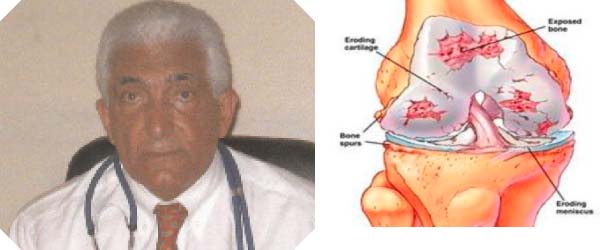
There are over 100 types of arthritis. Here is a description of some common ones, together with the causes:
Osteoarthritis - cartilage loses its elasticity. If the cartilage is stiff it becomes damaged more easily. The cartilage, which acts as a shock absorber, will gradually wear away in some areas. As the cartilage becomes damaged tendons and ligaments become stretched, causing pain. Eventually the bones may rub against each other causing very severe pain.
Rheumatoid arthritis - this is an inflammatory form of arthritis. The synovial membrane is attacked, resulting in swelling and pain. If left untreated the arthritis can lead to deformity.
Rheumatoid arthritis is significantly more common in women than men and generally strikes when the patient is aged between 40 and 60. However, children and much older people may also be affected.
Infectious arthritis (septic arthritic) - an infection in the synovial fluid and tissues of a joint. It is usually caused by bacteria, but could also be caused by fungi or viruses.
Bacteria, fungi or viruses may spread through the bloodstream from infected tissue nearby, and infect a joint. Most susceptible people are those who already have some form of arthritis and develop an infection that travels in the bloodstream.
What are the signs and symptoms of arthritis?
The symptoms of arthritis depend on the type, for example:
Osteoarthritis - The symptoms develop slowly and get worse as time goes by. There is pain in a joint, either during or after use, or after a period of inactivity. There will be tenderness when pressure is applied to the joint. The joint will be stiff, especially first thing in the morning.
The patient may find it harder to use the joint - it loses its flexibility. Some patients experience a grating sensation when they use the joint. Hard lumps, or bone spurs may appear around the joint. In some cases the joint might swell. The most commonly affected joints are in the hips, hands, knees and spine.
Rheumatoid arthritis - The patient often finds the same joints in each side of the body are painfully swollen, inflamed, and stiff. The fingers, arms, legs and wrists are most commonly affected.
Symptoms are usually worst on waking up in the morning and the stiffness can last for 30 minutes at this time. The joint is tender when touched. Hands may be red and puffy. There may be rheumatoid nodules (bumps of tissue under the skin of the patient’s arms).
Many patients with rheumatoid arthritis feel tired most of the time. Weight loss is common.
The smaller joints are usually noticeably affected first. Experts say patients with rheumatoid arthritis have problems with several joints at the same time.
As the arthritis progresses it spreads from the smaller joints in your hands, wrists, ankles and feet to your elbows, knees, hips, neck, shoulders and jaw.
Infectious arthritis - The patient has a fever, joint inflammation and swelling. He will feel tenderness and/or a sharp pain. Often these symptoms are linked to an injury or another illness. Most commonly affected areas are the knee, shoulder, elbow, wrist and finger. In the majority of cases just one joint is affected.
How will arthritis affect you?
Arthritis affects people in many different ways. How long the patient is affected and how severely it is depends on the type of arthritis. Arthritis sufferers will find there are good and bad days. Most patients with arthritis will suffer from discomfort, pain, stiffness and/or fatigue.
You may also feel frustrated that you are no longer able to grip things so well or get around like you used to. It is important to remember that if you suffer from arthritis this does not mean you have to give up having an active lifestyle. With some changes to your way of life there is no reason why you cannot continue being active.
“Many people with arthritis and rheumatic diseases suffer from joint pain and stiffness, which can cause a person to avoid exercise out of the fear of increasing their pain or causing injury. However, exercise, when properly planned and safely executed, can do just the opposite.”
Rheumatology offers the following tips for those wishing to embark on an exercise plan:
- Check with your rheumatologist first
- Ask your physical therapist for advice
- Set realistic goals, both short- and long-term ones. Include rewards for each achievement
- Plan ahead, so that you can identify pitfalls, obstacles or problems for your exercise program, and how to overcome them
- For variety, create a range of physical activities and do them in different locations
- Try starting off with friends or family members
- Keep a log of what you do so that you are aware of your progress
Living with arthritis
Although arthritis can make daily tasks more difficult and exhausting, there are many techniques and therapies, which added together, can give you a much better quality life, compared to no therapy at all.
It is important that people with arthritis seek medical health and treatment. Although there is no cure for arthritis, there is a lot you can do to minimize its overall effects on your everyday life.
You may wish or have to continue working, and with the right techniques and help from an occupational therapist you may find it is not as daunting as you first thought.
There is a lot you can do to minimize the impact your arthritis might have on family life and raising your children. A person with arthritis will need to remember that being there for the child is much more important than being a super active parent.
If you pace yourself and prioritize you will be surprised at how much you can achieve successfully. Be open with your family members about your arthritis - explain how it affects you so that they recognize when you may need extra understanding and support.
For further information visit the Government’s Hospital and clinics throughout the country, Number of NGO/Private Clinics, e mail to azadehhassan@yahoo.co.uk, or call on Dr Azadeh live Health program on AFRI-RADIO every Wed. from 9-9.30 am, or text to 002207774469 during working hours.
Author: Dr Azadeh Senior Lecturer at the University of The Gambia, Senior Consultant Physician


